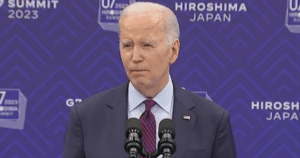Democrats Plan of Supreme Court Overhaul Could Backfire, Comments Victor Davis Hanson
Victor Davis Hanson Discusses Democratic Supreme Court Reforms on Fox News
In an interview on Fox News, Victor Davis Hanson expressed concerns about potential backlash against Democrats due to proposed reforms to the U.S. Supreme Court.
Hanson elaborated on the possible repercussions Democrats might face due to their efforts to implement judicial reforms.
On Monday's "The Ingraham Angle," Victor Davis Hanson, a senior fellow at the Hoover Institute, critiqued the Democratic push to reform the U.S. Supreme Court. Hanson's comments came as President Joe Biden and Vice President Kamala Harris have publicly supported significant changes to the court's structure and governance.
Biden's proposals, detailed in a Washington Post op-ed published the same day, include the introduction of term limits for justices and a binding code of conduct aimed at enhancing transparency and accountability.
The discussion referenced historical precedents, with Hanson drawing a parallel to attempts made by President Franklin D. Roosevelt in 1937, which were met with wide criticism and seen as damaging to his legacy.
Democratic Motivations and Historical Context
Hanson accused the Democrats of perceiving the Supreme Court as a "popular assembly," especially when rulings do not align with their political expectations. "Well, we know why, for over 80 years FDR had a black mark on his record and that was trying to pack the court in 1937. Everybody agreed with that and now they’re even worse," Hanson commented on the historical implications of such reform attempts.
He mentioned instances of perceived aggressive maneuvers against the judiciary by Democrats, including direct threats and protests directed at justices' private residences following controversial rulings.
Hanson referred to actions such as leaking draft opinions and threatening judicial figures as tactics used to influence court dynamics unfavorably when decisions do not benefit Democratic interests.
President Biden and VP Harris Endorse Changes
The administration's support for the judicial reforms was reiterated by Vice President Harris, who articulated a "crisis of confidence" in the current Supreme Court, citing ethics scandals and decisions that overturn long-established precedents.
Biden's proposal also suggests removing the immunity from prosecution for crimes committed by a former president while in office, which directly addresses concerns over political accountability.
The initiative for these changes was driven by Democratic lawmakers pushing for a reevaluation of Supreme Court operations amid growing public and political scrutiny.
Implications of Proposed Reforms
Hanson warned that these proposed changes could politically damage the Democrats if portrayed as an attempt to unduly influence the judiciary. He argued that such actions could be perceived as undermining the separation of powers, central to the United States' democratic framework.
"It’s going to hurt them, too, if the Republicans are wise and point this out to the electorate," Hanson commented, suggesting that the Republican Party could capitalize on perceived overreach by Democrats in their campaign narratives.
The strategy to reform the Supreme Court could therefore play a significant role in future electoral dynamics, potentially affecting public trust in both the judiciary and the Democratic Party.
Concluding Thoughts on Democratic Reforms
In summary, the push by Democrats to reform the Supreme Court, endorsed by high-level figures like President Biden and Vice President Harris, reflects a significant moment in American political discourse. The debates around these reforms involve a complex interplay of historical precedents, ethical considerations, and the perpetual balancing act between judicial independence and political accountability. As these discussions advance, they will undeniably shape the political landscape and public perception of judicial integrity in the United States.




